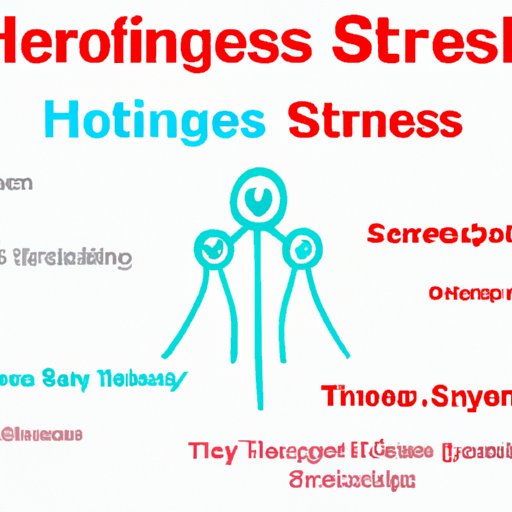
I. Introduction
Stress can take a toll on many aspects of a person’s life, including their overall health. One system that is particularly impacted by stress is the endocrine system, which is responsible for regulating hormones in the body. In this article, we will explore how stress affects the endocrine system and its hormones.
II. The Effects of Stress on Your Hormones: An Overview of the Endocrine System
The endocrine system is a complex network of glands that produce and secrete hormones. Hormones regulate a multitude of bodily functions, including growth, metabolism, and reproduction. When stress occurs, it can disrupt the balance of hormones in the body and have negative effects on the endocrine system.
III. Fight or Flight: How Stress Triggers Your Body’s Hormonal Response
When a stressful situation arises, the body goes into fight or flight mode. This response is a survival mechanism that prepares the body to react to a perceived danger. The hypothalamus in the brain sends signals to the adrenal glands, which then release hormones such as cortisol and adrenaline. Cortisol increases blood sugar levels and enhances metabolism, while adrenaline increases heart rate and blood pressure.
While this reaction can be useful in short-term and acute situations, prolonged fight or flight can have negative consequences on the body. This can lead to chronic hormonal imbalances that impact overall health.
IV. The Connection Between Mental Health and Hormonal Imbalance: Understanding the Role of Stress
The relationship between mental health and hormonal imbalance is a complex one. Chronic stress can lead to mental health issues such as anxiety and depression, which can then cause hormonal imbalances in the body. Conversely, hormonal imbalances can manifest in symptoms such as mood swings and sleep disturbances, exacerbating mental health problems.
V. Cortisol, Adrenaline, and More: How Stress Hormones Impact Your Health and Well-being
The hormones released during stress have numerous physiological effects on the body. For instance, cortisol can increase blood pressure and negatively impact the immune system. Adrenaline can cause rapid heart rates and irregular heartbeats. Prolonged exposure to these hormones can have long-term effects on both physical and mental health, including an increased risk of heart disease and depression.
VI. The Long-term Effects of Chronic Stress on Your Endocrine System and Overall Health
Chronic stress over time can lead to significant health problems, including hormonal imbalances and chronic illnesses such as diabetes, cancer, and heart disease. These long-term effects can significantly impact a person’s overall health and well-being.
Managing stress effectively is key to preventing these negative outcomes. There are numerous stress management techniques, such as exercise, meditation, and therapy, that can help combat the negative effects of chronic stress.
VII. From Weight Gain to Sleep Disturbances: The Wide-ranging Effects of Stress on Your Hormones
Stress has wide-ranging effects on various bodily functions, including digestion, sleep, and metabolism. Chronic stress can lead to weight gain, insomnia, and other health problems. Stress management is critical in minimizing these negative effects and achieving optimal health.
VIII. Conclusion
The endocrine system plays a vital role in regulating hormones that impact many aspects of daily life. Stress can negatively affect this system, leading to long-term health issues such as chronic diseases. Managing stress is critical to maintaining hormonal balance and overall health and wellness. By incorporating stress management techniques into daily life, individuals can take control of their mental and physical health.




